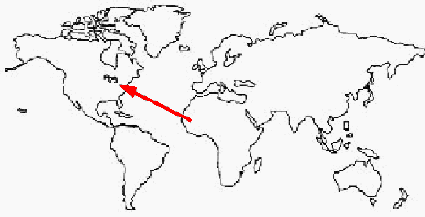|
Portuguese Investigate Africa

With the exploits of Prince Henry the Navigator in the
1400s, Portugal was the first European country to go beyond the known limits of northern
Africa, exploring the lower west coast and returning to Portugal with captured slaves and
other riches. In 1442, the Portuguese began a trade that would not end until the 1800s;
producing gold and slaves for the country. However, the Portuguese did not invent slavery.
It dates back to the ancient Greeks keeping slaves, and Moses leading the Israelites out
of bondage in Egypt.
Vasco da Gama in 1498, reinforced Portugal’s control
of the slave trade during a voyage that sailed around the Cape of Good Hope into the
Indian Ocean. This epic discovery of a sea route to the east was soon followed by the
establishment of Portuguese colonies on the continent’s coast that produced spiraling
riches in the slave trade for Portugal. Rumors of wealth in this newly discovered region
captured the interest of other European powers, including England, Spain, Holland, Denmark
and France. Within a few years, Africa’s coastal regions became home to thousands of
European colonists, traders and explorers who bought and plundered the valuable resources
of the native inhabitants.
Serious exploration of the continent’s interior took
place during the 18th and 19th centuries with such luminaries as James Bruce, Mungo Park,
Martin Liechtenstein, Hugh Clapperton, Richard and John Lander, Heinrich Barth, Sir
Richard Francis Burton, John Hanning Speke, James Augustus Grant, Sir Samuel White Baker,
David Livingstone, and the hundreds of Christian missionaries who ventured inland to live
among the natives.
With the founding of the African Association in 1788, many
of these white explorers traveled throughout Africa under the auspices of this and other
respected associations. The most famous and enduring of these illustrious explorers was
the internationally renowned David Livingstone whose
activities in the deepest regions of the continent proved invaluable in the mapping of
Africa’s interior. His most famous recorded meeting, after the outside world had
received no news of his whereabouts and feared for his safety, came when he was found by
the American journalist/explorer Henry M. Stanley, whose infamous words on meeting
Livingstone, "Dr. Livingstone, I presume?," have immortalized both of
them.
It was 1870, and
Livingstone and Stanley explored the region together until Livingstone set out separately
to reach the source of the Nile River. In 1871, he died in a native village, and, although
his remains are interred in Westminster Cathedral, his followers, upon his death in
Africa, buried his heart beneath a tree at the spot where he succumbed. He was greatly
respected by African tribes for his devotion to Africa and its people, including his
disgust of the slave trade that still permeated the continent even after it had been
outlawed. Livingstone was considered one of the pioneers in its final demise.
The exploration of Africa allowed the world to view the abundance of natural
resources that ultimately resulted in the conquest of its inhabitants and the colonization
of its land by European settlers. The continent was literally carved up by the European
nations, particularly England and France; establishing new country boundaries that
foolishly disregarded tribal homeland perimeters, causing tribal wars, dissension, and
anxieties that have perplexed Africans ever since.
Excerpted
from a speech given by Reverend David Livingstone, L.L.D. in Edinburgh, Scotland,
September, 1857.THEY PURCHASE
SLAVES
"As it would not be much profit to
have come home and made myself only a nine days' wonder, I wish to give you a little
information, so that your sympathies may be drawn out more effectually to the land from
which I have come. I am thankful to see so many assembled and to see the sympathy
manifested to me as the representative of that land from which I have come. In going back to that country my object
is to try and get a permanent path into the central region, from which most of the slaves
have always been drawn. The native slave-drivers go into the centre of the country and
carry our manufactures there and with a few yards of cloth they purchase slaves and then
they take them to the sea coast. The people are so anxious to get a little of our
manufactures that, in return for them, they part, not with their own children, but with
children kidnapped from other tribes. Now, I hope to be able to make a path by the Zambesi
into the central country, and then, if we can supply the people with our goods for lawful
commerce, I think we have a fair prospect of putting a stop to the slave-trade in a very
large tract of country."
'Black History' segment
written in June, 1998 by David Lodge
[ Back to Black History Index ]
|

